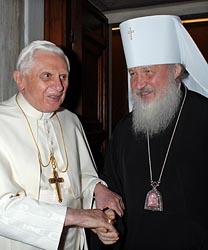New Russian Orthodox Leader

News that Metropolitan Kirill was elected Saturday to be the interim leader of the Russian Orthodox Church means that he is now on course to succeed Patriarch Alexei II, whose funeral took place in Moscow today.
Metropolitan Kirill is expected to become the new patriarch in six months time.
But views on whether his election will be good for Orthodox-Catholic relations are mixed. On the one hand, Metropolitan Kirill’s resume looks ideal: he has wide experience and expertise in ecumenical relations, knows senior Vatican and Church officials well, and has spent many years in charge of the Russian Orthodox Church’s foreign affairs department.
However, many regard him as a nationalist and overly political, even more so than Alexei whose insistence that Russians all belong to the Orthodox Church caused much friction with the Catholic Church (the most well-known dispute occurred when Alexei accused the Catholic Church of proselytizing).
In recent public statements, Metropolitan Kirill has called on Russians to do everything they can to build a fundamentally Orthodox civilization and state, according to an AFP news report.
However, in an interview over the weekend with the Italian daily Il Giornale, former Vatican “foreign minister” Cardinal Achille Silvestrini said he was “cautiously optimistic” about better Catholic-Orthodox relations following Patriarch Alexei’s sudden death last week. Cardinal Silvestrini believes an “irrevocable path has been undertaken” towards improved relations, even if some perspectives will remain “unchanged.”
Relations with the Russian Orthodox Church have improved in recent years partly because of Alexei’s admiration for Pope Benedict XVI, whose German nationality was easier for the Russian Orthodox leader to deal with than John Paul II’s Polish origins, but also because of Alexei’s willingness to draw closer to the Catholic Church in the face of growing, radically secular values.
So good were relations becoming that Cardinal Silvestrini said the long hoped-for meeting between Alexei and the Pope would have been very likely if Patriarch Alexei “had lived another year.” Now that historic meeting is once again in doubt.
— Edward Pentin












